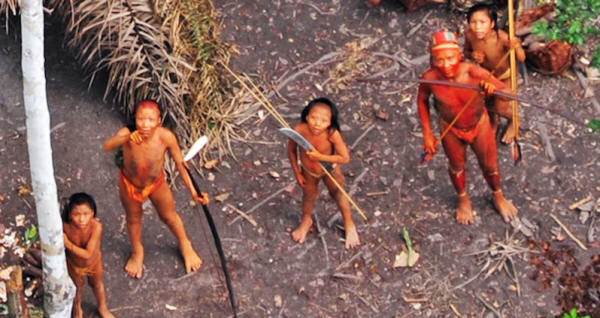|
In recent years, aid organizations and companies working to extract resources from the vast wilds of the Amazon rainforest have reported a number of sightings of uncontacted tribes, the last remaining holdouts of a simpler time.
While fascinating to see human beings still living in such a natural state, many of these tribes simply do not wish to assimilate into Western culture, and activists are working to preserve many areas of the rainforest, preventing their lands from being turned over to oil and gas exploration.
While success stories are few and far between, a recent announcement by a Canadian energy company is positive news, as they have agreed to withdraw initiatives to drill for oil in a region of Peru inhabited by uncontacted members of the Matsés tribe.
The effort to convince Pacific Rubiales E&P to withdraw from Block 135 was led by Survival International, a "global movement for tribal peoples' rights."
This particular area of rainforest in Peru is home to more uncontacted tribes than anywhere else on earth, yet Block 135 had been sold to Pacific E&P by the Peruvian government for the exploration of oil and natural gas.
Reporting on the effort to stop Pacific E&P from entering Block 135, Survival International states:
In an open letter to the world, Survival International denounced the Peruvian government's role in selling out the rainforest and its peoples:
Statements in 2016 by the tribal council of the Matsés express the need for coming together to battle the oil companies responsible for destroying land and dislocating people:
Final Thoughts
More global action is needed to bring justice to the peoples of the Amazon and to preserve the rainforest for future generations.
Yet the genocide continues under the merciless power of wealthy corporations and corrupt governments who view the rainforest as a profit center rather than the center of life on planet earth.
As Ecuador has proven, there is little financial and global interest in official programs that seek to permanently preserve areas of the Amazon such as the Yasuní, a place which has the highest concentration of biodiversity on the planet.
When given free rein to 'explore' the Amazon, oil companies have a long and heart-breaking history of laying waste to the ecosystems and wildlife of the rainforest, causing widespread contamination of earth and water with oil spills, while covering up these crimes and viciously battling in court to avoid taking responsibility for such atrocities.
For insight into how oil companies avoid liability and responsibility by faking data, review this 2015 below video in which Chevron contractors are caught on tape lying about oil samples taken in a destroyed region of the Amazon:
|


